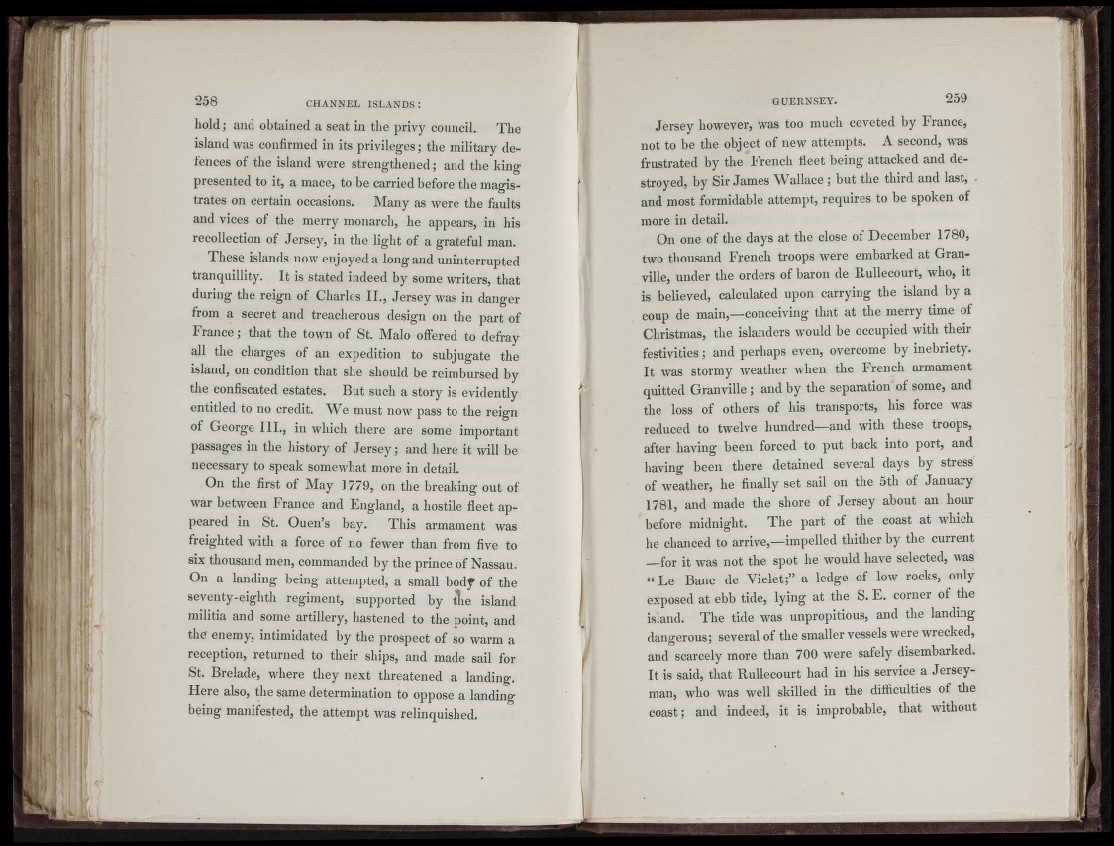
ir,; ,
E' 'if :! f
M' :i
i,
i ' i.
i
: i ■ I
1’ ,
H:
Ehold;
and obtained a seat in the privy council. The
island was confirmed in its privileges; the military defences
of the island were strengthened; and the king
presented to it, a mace, to be carried before the magistrates
on certain occasions. Many as were the faults
and vices of the merry monarch, he appears, in his
recollection of Jersey, in the light of a grateful man.
These islands now enjoyed a long and uninterrupted
tranquillity. It is stated indeed by some writers, that
during the reign of Charles II., Jersey was in danger
from a secret and treacherous design on the part of
France; that the town of St. Malo oifered to defray
all the charges of an expedition to subjugate the
island, on condition that she should be reimbursed by
the confiscated estates. But such a story is evidently
entitled to no credit. We must now pass to the reign
of George III., in which there are some important
passages in the history of Jersey; and here it will be
necessary to speak somewhat more in detail.
On the first of May 1779, on the breaking out of
war between France and England, a hostile fleet appeared
in St. Ouen’s bay. This armament was
freighted with a force of no fewer than from five to
six thousand men, commanded by the prince of Nassau.
On a landing being attempted, a small hodf of the
seventy-eighth regiment, supported by tlie island
militia and some artillery, hastened to the point, and
tho enemy, intimidated by the prospect of so warm a
reception, returned to their ships, and made sail for
St. Brelade, where they next threatened a landing.
Here also, the same determination to oppose a landing
being manifested, the attempt was relinquished.
Jersey however, was too much coveted by France,
not to be the object of new attempts. A second, was
frustrated by the French fleet being attacked and destroyed,
by Sir James Wallace ; but the third and last,
and most formidable attempt, requires to be spoken of
more in detail.
On one of the days at the close of December 1780,
two thousand French troops were embarked at Granville,
under the orders of baron de Rullecourt, who, it
is believed, calculated upon carrying the island by a
coup de main,—conceiving that at the merry time of
Christmas, the islanders would be occupied with their
festivities; and perhaps even, overcome by inebriety.
It was stormy weather when the French armament
quitted Granville; and by the separation of some, and
the loss of others of his transports, his force was
reduced to twelve hundred—and with these troops,
after having been forced to put back into port, and
having been there detained several days by stress
of weather, he finally set sail on the 5th of January
1781, and made the shore of Jersey about an hour
before midnight. The part of the coast at which
he chanced to arrive,—impelled thither by the current
—for it was not the spot he would have selected, was
“ Le Banc de Vielet;” a ledge of low rocks, only
exposed at ebb tide, lying at the S. E. corner of the
island. The tide was unpropitious, and the landing
dangerous; several of the smaller vessels were wrecked,
and scarcely more than 700 were safely disembarked.
It is said, that Rullecourt had in his service a Jerseyman,
who was well skilled in the difficulties of the
coast; and indeed, it is improbable, that without
fi
!